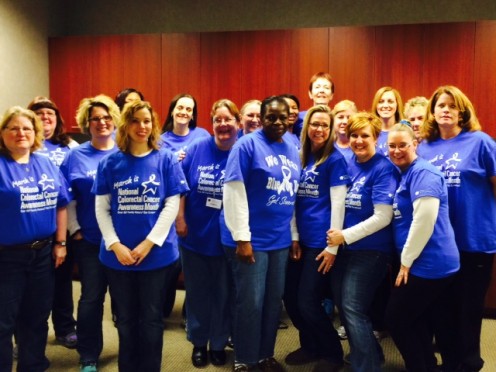March is National Colorectal Cancer Awareness Month
The month of March is Colorectal Cancer Awareness Month. At Charlotte Gastroenterology and Hepatology, we feel that it’s our responsibility to make members of our community aware of the fact that screening saves lives. Each and every Friday, staff members can wear jeans for a $2.50 donation which goes towards a number of GI-related causes, including the Colon Cancer Coalition’s Get Your Rear in Gear. During the month of March, each physician and staff member is provided a t-shirt that they can wear during Jeans Day to help further raise awareness of colorectal cancer.
Among men and women, colorectal cancer, or cancer of the colon or rectum, is the second-leading cause of cancer-related deaths in the United States. Only lung cancer claims more lives. The American Cancer Society estimates that approximately 137,000 new cases of colorectal cancer will be diagnosed in the United States in 2014.
The risk of developing colorectal cancer increases with age, with more than 90 percent of cases occurring in people 50 and over. The Centers for Disease Control and Prevention estimate that 60 percent of colorectal cancer deaths could be prevented with routine screening. “Due to the slow growth of colon polyps and ease of removal with colonoscopy, we can significantly reduce the chance of colon cancer with regular screening,” says Dr. Scott A. Brotze of Charlotte Gastroenterology and Hepatology.
The American Cancer Society recommends a colonoscopy for colon cancer screening beginning at age 50. People with a higher risk of developing colorectal cancer (such as those with specific gastrointestinal symptoms, certain genetic disorders, and/or a personal history of polyps or colorectal cancer) should begin screening at a younger age and more frequently.
“A common misunderstanding is that colon cancer screening is more important for those with a family history of polyps or colon cancer,” says Dr. Michael W. Ryan. “Actually, most cases of colon cancer occur in people with no known history of polyps or colon cancer. Therefore, colon cancer screening prevention is important for all patients regardless of family history.”
